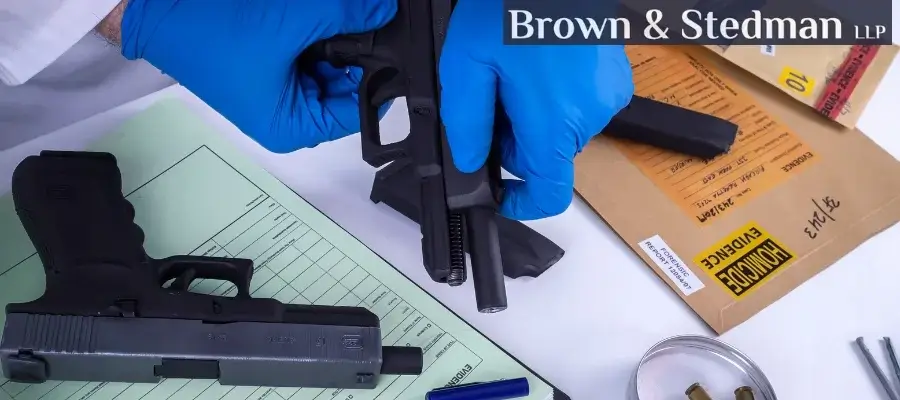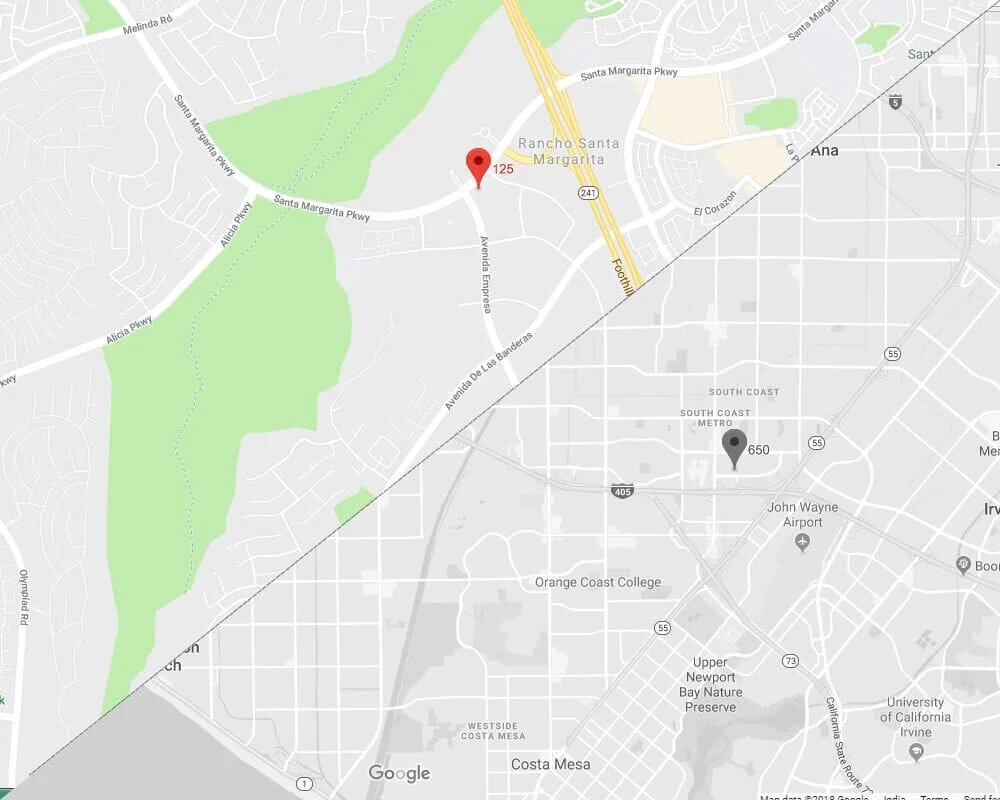Moreno Valley Homicide Defense Attorney

Moreno Valley Homicide Defense Lawyer
If you or a loved one is under investigation or actively being charged for the death of another person, you need a skilled and experienced Moreno Valley homicide defense attorney to fight for you. At Brown & Stedman LLP, we understand that when your life and future are on the line, you need a powerful murder defense lawyer to fight tirelessly on your behalf, as they can determine the most effective defenses for your case.

Understanding Homicide Charges and Penalties in California
Murder charges are some of the most serious allegations that a person can face in California. The state recognizes several different types of this crime, including:
First-Degree Murder
First-degree murder involves a deliberate and premeditated killing, where the perpetrator intentionally causes the death of another after careful planning. Premeditation doesn’t require a long period of planning; it just means that the defendant had a conscious intention to kill before they did so.
In California, the felony murder rule can also lead to a first-degree murder charge. This rule states that, if a defendant commits a felony and, during the act, someone dies, they can be held responsible for their murder. Common felonies that can trigger the felony murder rule include robbery, sexual assault, burglary, arson, and kidnapping.
A conviction for first-degree murder can come with an extensive prison sentence. The sentence could be extended to life in prison without parole if:
- The offense was a hate crime based on the victim’s disability, gender, race, nationality, or sexual orientation.
- The charges included aggravating factors, like torture or gang-related activity.
- The defendant has a criminal history.
When a gun is used during the commission of certain felonies, including murder or attempted murder, California has a “10-20-Life” or “Use a Gun & You’re Done” Law. This includes a sentence enhancement, which progressively increases depending on the severity of the following circumstances:
- The defendant used a firearm during the crime.
- The defendant fired the gun during the crime.
- The defendant used the firearm and caused great bodily injury or death.
Capital Murder
Capital murder is first-degree murder that carries the potential for the death penalty. It is designated for particularly heinous crimes, including:
- The killing of a police officer or firefighter
- Serial murders
- Murder during a kidnapping or sexual assault
- Murder by torture
- The murder of a witness to prevent them from testifying
Even if a person is convicted of capital murder, the death penalty is not automatically imposed. It depends on the circumstances of the crime, the defendant’s criminal history, and jury opinions. Furthermore, the state may have a moratorium on the death penalty at the time of sentencing.
Second-Degree Murder
Second-degree murder is the intentional killing of another person without premeditation, meaning that the defendant intended to kill but did not plan or think about it beforehand. It is considered slightly less serious than first-degree murder.
A second-degree murder conviction comes with a sentence of a few years to life. The sentence could be longer if:
- The defendant has a prior criminal record.
- The killing was through a drive-by-shooting.
- The victim was a law enforcement officer.
The sentence could be reduced based on the defendant’s age, mental state, and the role they had in the crime.
Attempted Murder
Attempted murder is when an attempt to kill another person is made, either with premeditation or not. These charges can be brought, even if the victim was not harmed, and it can be classified as a first or second-degree offense under California law.
The punishment for attempted murder is dependent on the crime that was committed. If it is classified as first-degree attempted murder, a defendant may be sentenced to several years in prison. With second-degree attempted murder, a defendant may be sentenced to a few years in prison.
Voluntary and Involuntary Manslaughter
Voluntary manslaughter occurs when a person kills another person in the heat of passion rather than pre-planning the act. It typically stems from an argument or when a person is put in a stressful situation. Involuntary manslaughter is the same principle, but the killing is unintentional.
Vehicular Manslaughter
Vehicular manslaughter can happen when a person’s reckless or negligent driving causes the death of another person. This could be from driving while intoxicated, excessive speeding, failing to yield, or while distracted.
The penalties for vehicular manslaughter are dependent on the situation but could include several years in prison, the loss of driving privileges, and hefty fines.
Damages to a Family in Homicide Cases in Moreno Valley, CA
On top of the criminal punishment for murder or manslaughter in Moreno Valley, CA, the family of the victim can potentially sue for economic, non-economic, and punitive damages. The most common is wrongful death, which can procure compensation for the loss of the victim’s financial support, companionship, and the emotional impact of their loss. Families have within two years from the date the victim died to file a civil claim.
Family members could also recover economic damages to cover funeral and burial expenses and any medical expenses incurred during hospital stays or treatment. Non-economic damages can include the loss of companionship, love, and support that the victim provided to their family, along with emotional distress that was suffered during the loss
In some cases, punitive damages may be awarded as a punishment to the defendant to deter similar egregious behaviors in the future. Punitive damages are rarely awarded, as the court must deem that the defendant’s conduct was reprehensible.
Other Consequences of a Homicide Charge in Moreno Valley, CA
The consequences of a homicide charge are not only confined to the criminal charges. They also include impacts on the defendant’s life moving forward after their acquittal or release.
A major non-criminal impact on a person after a homicide charge is the social repercussions. A person may find their relationships with family or friends strained and experience social isolation, a loss of reputation, stigma, and discrimination. Even if a person was acquitted, community members may still look at them fearfully or with disdain.
Since many employers are hesitant to hire people with a criminal record, a person may also experience difficulty finding or maintaining employment. This, paired with the impact of legal costs and lost wages, can put a person in a situation of financial instability.
With the difficulty of finding employment, it can be hard for a person with a homicide conviction or even an acquittal to pursue or continue education. They could lose scholarships, grants, or class credits, which may have expired.
Securing quality housing comes with obstacles as well, as many landlords may be uneasy about renting to people with a criminal record, or they may charge higher rental rates because of any perceived risks to their operations. Housing applications could be denied based on a background check, and many public housing agencies may have strict eligibility criteria that exclude more severe criminal convictions like homicide.
All these setbacks, along with the stress, trauma, and uncertainty that a person may have faced from a trial or conviction, could lead to mental health impacts, such as:
- Depression
- Anxiety
- Post-traumatic stress disorder (PTSD)
- Guilt
- Shame
- Substance abuse
- Suicidal thoughts
Strategies to Fight a Murder Charge
If you or a loved one has been charged with murder or manslaughter in California, different defenses may be used on your behalf. The strategy we may choose depends on your criminal history and the details of your case. Possible defense options might include:
Legal Motions to Dismiss Charges
If law enforcement and the prosecution want to punish someone for breaking the law, then they must follow it themselves. There are motions that the defense can make to weaken the case and inspire reasonable doubt in the jury. They could even get the case dismissed outright. Common legal motions in homicide cases include:
- Motion to Dismiss the Case: By filing this motion, an attorney can ask the court to dismiss the charges against their client based on lack of jurisdiction, lack of probable cause, too much time between the charges being filed and the beginning of the trial, violation of constitutional rights, or even double jeopardy.
- Motion to Suppress Illegal Evidence: If evidence gathered against the defendant was obtained illegally, the judge could rule that the evidence cannot be used in the trial. This can substantially weaken the prosecution’s case.
- Motion to Dismiss an Improper Charge: Prosecutors will often try to charge defendants with as many crimes as possible, even if the evidence only supports some of the charges. Defense attorneys can file motions to dismiss charges that are not supported by evidence, thus reducing potential penalties or even forcing the prosecutor to offer a plea deal.
- Motion to Prevent Certain Testimonies: This motion is used to request that the judge prohibit the prosecution from introducing certain evidence or testimony in the trial, especially for reasons such as lack of relevance, prejudice, hearsay, prior acts from the defendant, or something being protected by a privilege.
Potential Defenses Against Moreno Valley, CA Homicide Charges
Even though homicide is a serious crime, there are potential defenses that can be used to either reduce the sentence or achieve an acquittal, including:
Accidental Death
Everyone knows that accidents happen. If a person was arrested after a lawful activity ended with the non-malicious killing of another, that act qualifies as an “excusable homicide.” The defense must include evidence that there was no intent to harm the victim, usually through witness testimonies, physical evidence, and expert opinions.
Alibi
If the defense can demonstrate that the defendant was elsewhere at the time of the crime, this is providing an alibi. Alibi evidence can include witnesses, documentation, or electronic records, such as cell phone records or timesheets. An alibi establishes that the accused could not have committed the crime because they were physically incapable of being present at the scene.
Mistaken Identity
If the prosecution heavily relies on eyewitness testimony or circumstantial evidence, it could be argued that the defendant was wrongfully identified, and someone else is responsible for the crime. Backing this argument up with an alibi and forensic evidence could challenge the reliability of the prosecution’s eyewitnesses.
Self-Defense or Defense of Others
Under California’s self-defense statutes, a person has the right to protect their or another person’s life if they believe, in good faith, that either is at risk of being killed, seriously harmed, sexually assaulted, robbed, or otherwise victimized in another violent crime. It could be deemed as “justifiable homicide” if a person acted in defense with reasonable and necessary force.
Insanity
A defense lawyer could present evidence that the defendant was insane at the time of the crime. Under the California Penal Code, legal insanity requires that the person, by reason of mental disease or defect, was incapable of either knowing or understanding the severity of their act or could not distinguish between right and wrong at the time of the crime. To prove this, the defense will present expert testimony from mental health professionals.
Police or Prosecutor Misconduct
Police or prosecutor misconduct can mean a dismissal of charges, suppression of evidence, or even an acquittal. During the initial investigation, a police officer might violate ethical or legal standards, most commonly by:
- Conducting illegal searches and seizures, which violates the Fourth Amendment
- Coercing confessions through psychological or physical abuse
- Fabricating or planting evidence to ensure a conviction
- Not disclosing any evidence that could exonerate the defendant
- Intimidating witnesses to alter their testimonies
Once the case is handed over to the prosecution, there is room for prosecutor misconduct. Some common types are:
- Making prejudicial statements during the trial, like presenting inadmissible evidence or making inflammatory comments
- Misleading the court by presenting false evidence
- Charging a defendant based on their race or religion rather than any evidence
- Withholding evidence that could prove the defendant’s innocence
Negotiating Plea Bargains in Homicide Cases in Moreno Valley, CA
Plea bargains can be extremely effective in reducing the severity of the charges. A plea bargain is an agreement between the defense and the prosecution. In these arrangements, the defendant can plead guilty to a lesser charge to receive a more lenient sentence or a dismissal of additional charges.
The defense attorney and prosecution can discuss the possibilities of a plea deal, weighing factors such as the:
- Prosecution’s evidence
- Defendant’s criminal history
- Nature of the crime
- Prosecutor’s willingness to negotiate
If they have a weaker case, they are more likely to accept a plea deal, especially if going to trial could be avoided.
The two parties can negotiate terms and make counteroffers until they can reach an agreement. Then, the plea bargain is finalized and given to the court for approval. The judge will review it to ensure that it is fair and just. If it is approved, the defendant will enter the guilty plea.
A Moreno Valley Murder Defense Lawyer Can Protect Your Future
Every defendant who is navigating the criminal justice system in California needs the representation of a dedicated, intelligent Moreno Valley homicide defense attorney. Homicide charges are serious, so don’t put your future on the line. Your defense attorney can be by your side through the whole process, from police questioning to a potential trial.
FAQs
Q: What Is the Difference Between Murder and Manslaughter in California?
A: Murder and manslaughter are both charges brought against someone who caused the death of another person. Murder is when this is done with intent beforehand, and manslaughter is done without any intent. While murder is considered a more serious crime, manslaughter can still carry severe penalties, including imprisonment, fines, or restitution.
Q: Can a Homicide Charge Be Reduced to a Manslaughter Charge?
A: Yes, a homicide charge can be reduced to manslaughter if it can be proven that there was a lack of intent or provocation. A manslaughter charge can also apply if the defendant was acting in the heat of the moment. A defense lawyer could argue that the defendant acted in self-defense or suffered from diminished capacity to help reduce the charges from homicide to manslaughter.
Q: What Rights Do I Have During a Homicide Investigation?
A: If you are involved in a homicide investigation, you have the right to:
- Remain silent.
- Have an attorney.
- Post bail.
- Have a speedy trial.
- Have a jury trial.
- Avoid incriminating yourself.
These rights are protected by the U.S. Constitution and California law. A skilled and knowledgeable murder defense lawyer can be vital in securing these rights through your case.
Q: What Is the Role of Intent in a Homicide Case?
A: Intent is the main factor in determining the severity of a homicide charge. Murder typically requires a deliberate intent to kill or cause harm, while manslaughter involves a lack of intent. The presence of intent could mean more severe charges, including the death penalty, while a lack of proven intent could mean manslaughter charges instead of murder.
Q: What Are the Consequences of a Homicide Conviction?
A: A homicide conviction comes with severe consequences, such as imprisonment, fines, restitution, and even the death penalty. Beyond the legal repercussions, a conviction can damage relationships and be emotionally tolling on the defendant and their family. If they are released, there could be restrictions on employment, housing, education, and voting opportunities as well.
Your Future Is at Stake – Contact Us Today
If you or a loved one is facing homicide charges in Moreno Valley, you need a homicide defense attorney who genuinely understands the risks to your future and how to effectively defend your rights. At Brown & Stedman LLP, we can provide uniquely personalized legal representation and deliver the highest quality legal services. Contact us today to set up an initial consultation.
Learn More About What We Can Do To Help
We invite you to call us at 949-459-5900 to schedule your free initial consultation. You can also reach our firm by contacting us online.
Tell Us About Your Case
Each time we take a case, we look at the big picture: What can we do to best help solve the problem as efficiently as possible. We use our experience and creativity to propose solutions that allow you to put your legal matters behind you.
© 2025 Brown & Stedman LLP. All rights reserved.









